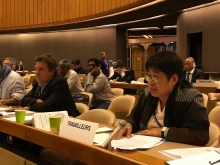PSI addresses the Committee on Labour Migration of the 106th International Labour Conference in Geneva

“At a time of increasing displacement, changing migratory patterns, attack on migrant workers’ rights, rising inequality and lack of development, the role of the ILO in protecting the human and labour rights of migrant workers and in promoting the rights-based normative framework, including in the Global Compact on Migration, is extremely important.” This was the key message delivered by PSI at the opening session of the Committee on Labour Migration of the 106th Session of the International Labour Conference (ILC) taking place on 5-14 June 2017 in Geneva.
As decided at the 325th Session of the ILO Governing Body, the 2017 ILC will hold a general discussion on labour migration, which will focus on effective labour migration governance at national, bilateral, regional and interregional levels, and on fair recruitment. The discussion also comes at a time when the United Nations is working towards the adoption of a Global Compact on Safe, Orderly and Regular Migration in 2018.
The conclusion and outcome of the general discussion will provide the blueprint for the ILO constituents and the Office to address the current context of labour migration and to contribute to the Global Compact.
Working in solidarity within the Workers’ Group of the Committee, PSI comes to the general discussion, highlighting its key priorities:
- Reiteration of the rights-based normative framework by promoting ratification, adherence to, strengthening of, and effective implementation of the ILO Migrant Workers Convention C97 and C143 and their accompanying Recommendations.
- Facilitating rights-based labour migration and social protection through multilateral and bilateral labour agreements that are transparent, fully in line with international norms and labour standards and have the involvement of the social partners. In view of this, PSI unions bring the good practice experience in the Germany-Philippines Bilateral Labour Agreement (BLA) on Nurses. Signed in 2013, the agreement includes all the elements of protection, fair recruitment, non-discrimination, trade union rights and social security. PSI unions, i.e. PSLINK in the Philippines and Ver.di in Germany, are part of the Joint Monitoring Committee of the BLA, wherein the unions are actively engaged in monitoring its implementation, including through visits and dialogue in the Philippines and in Germany. This good practice shows that social dialogue and joint engagement in promoting workers’ rights and addressing labour migration costs, is possible within a bilateral labour agreement.
- Highlighting that the State has the ultimate responsibility to govern and regulate international recruitment in line with international human rights norms and labour standards. Public employment agencies play an important role in implementing fair recruitment, ensuring transparency, anti-corruption and protection of whistle-blowers. Government-to-government recruitment, particularly on health worker migration, is an effective way to ensure protections and promote mutual responsibility in mitigating the social and developmental impact of migration.
- Welcoming the emphasis placed in the discussion on migrant workers’ access to and portability of social protection and linking this to access to quality public services for all.
- Supporting the importance of fair and ethical recruitment and advancing the 2016 ILO Guidelines and Principles on Fair Recruitment. PSI strongly maintains the prohibition of the charging of recruitment fees on migrant workers. Any new standard that will be developed must contribute to strengthening the existing ILO Conventions and must in no way legitimise temporary and circular migration as the norm in labour migration.
- The mutual recognition of skills and qualifications is an important aspect of work, particularly in the health and care sectors. This must take into account fairness, non-discrimination, equality of opportunity and treatment and protection of rights. With mutual recognition, must come mutual responsibility by States to ensure the sustainable development of the health workforce in both origin and destination countries.
- Gender equality must be integrated in the general discussion. The discussion and outcomes must take into account addressing the vulnerabilities faced by women migrant workers, but likewise emphasising women’s empowerment through trade union rights and gender sensitive policies and interventions.
Click here to read the full PSI Statement.

